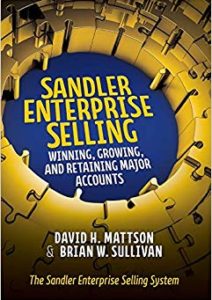Wise words from Denis Waitley, American author, speaker and consultant, especially for those of us who sell. For as we approach the end of Q1 in our selling year, we’ve likely encountered a few 2024 losses along the way – some we may have been counting on as wins. Waitley continued his quote with “Failure should be our teacher, not our undertaker. It is delay, not defeat”. It’s interesting that this U.S. Naval Academy grad and decorated Navy pilot offers such profound words about learning from losses when his most famous book was The Psychology of Winning. You can bet he was taught so well by his failures that his chances of winning increased with each setback. And for all of us who have chosen to make selling our career, the cruel fact is that losing happens. It simply doesn’t matter how good you are, you will invariably come up short, as you may already have this year. So, how do we make sure that we connect with the teacher and not the undertaker, to make the most of the next three quarters?
Think about it. After losing an opportunity, grief often trumps logic. At some point, though, someone on the losing team will say, “We should learn from this so we can be sure it won’t happen again”. There it is – the voice of reason. Makes sense, right? So, why is it that so many selling organizations do such a lousy job of it? Why do they fail miserably at conducting post-mortems on lost deals? For otherwise capable selling organizations, why is it so difficult to analyze losses? The answer, as is so often the case, lies in the power of human nature.
Ponder this for a moment. Most major metropolitan areas have publications that broadcast the top local physicians – the best dermatologists, surgeons, rheumatologists, etc. But is any recognition given to coroners? No. But why not? It’s simple, really. In their work, coroners analyze the details of a loss. While there’s great value in their lessons learned, there’s a problem. A people problem. No one wants to dwell on a loss. We look away and focus elsewhere. Like on the top pediatricians.
There’s another pragmatic reason why selling organizations are often so poor at conducting post-mortems. There are no frameworks to follow. We may know some people who plan their own funerals but, truthfully, they’re rare. But that advance work sets the stage for organized and successful send-offs for the deceased. And the frameworks that do the same for pursuit post-mortems are built long before deals are actually lost. For successful post-mortems begin with Go/No-Go processes to insure you pursue the deals you are most likely to win and forego those in which your chances are low. Your ability to identify and pursue these “profile” deals is fundamental. But how do you get good at doing it?
It begins with a candid assessment of what your organization does well and not so well, combined with a clear picture of what constitutes a customized profile opportunity. These two elements must be part of your organizational DNA, crafting the framework previously mentioned and giving clarity to your Go/No-Go decision-making. I suggest assembling the issues surrounding an opportunity into three categories – Client Issues, Selling Team Issues, and Finance/Contract Issues. Then, you bring together the relevant individuals in your organization to review the issues. This collaboration determines how stable or risky each issue is. For example, do you have relationships with the account at multiple levels? Do you know your competition, their offerings and the relationships they have with the account? Are there stated guarantees, warranties or penalties in the contract and do you understand their consequences? Think about these questions and others. How could you not evaluate them and decide to move forward without understanding their implications? If your team feels comfortable with an issue, check the box and move on. But if risk is identified, you must decide what to do. Building practical mitigation plans to address risks is vital. No good can come from delays on risky issues.
The results of your mitigation efforts power your Go/No-Go framework. And if you make the decision to proceed, with identified risks mitigated as much as possible, your due diligence increases your chances of winning. There are no guarantees, of course – losing happens. And if it does, the very Go/No-Go framework that supported your decision to move forward is also the template for your post-mortem. Remember all those issues you reviewed to mitigate risk? If you end up losing, you missed something. Maybe you miscalculated an impact, ignored a dependency or gave yourself too much benefit of the doubt. But the information that dictated your decision to proceed was clear. At least it was at the time. Reviewing it now, in the clarity of the loss, teaches you lessons to help you avoid making the same mistakes again.
Go/No-Go decision-making is a survival skill in selling. Of course, it helps you determine which deals to pursue and which to avoid. But it also acts as your framework for learning from losses. So put it in play and proceed with the teacher, not the undertaker.






Comments